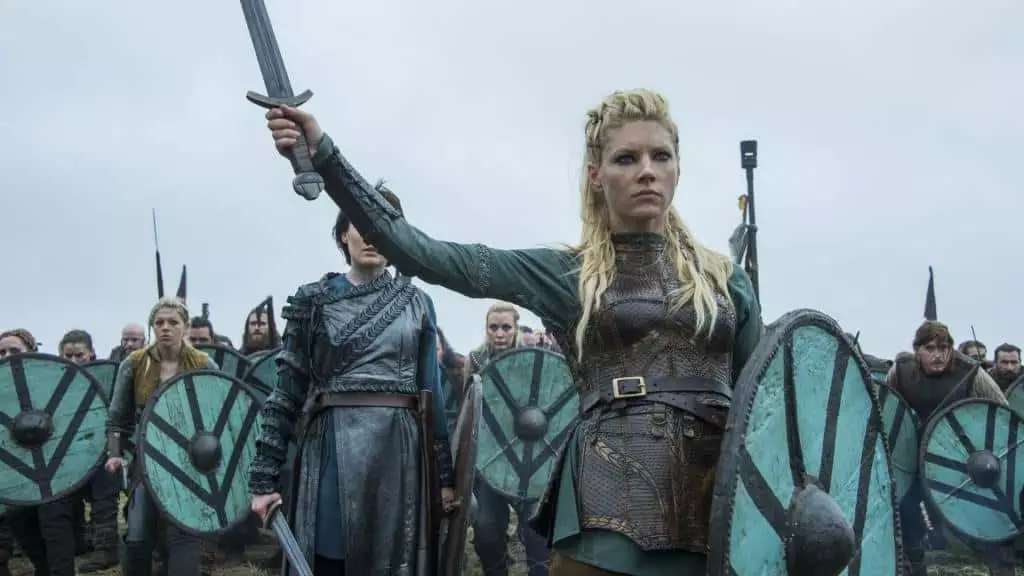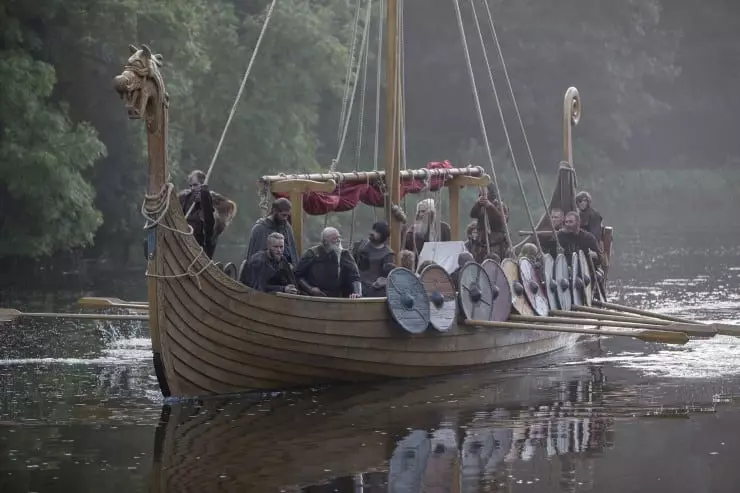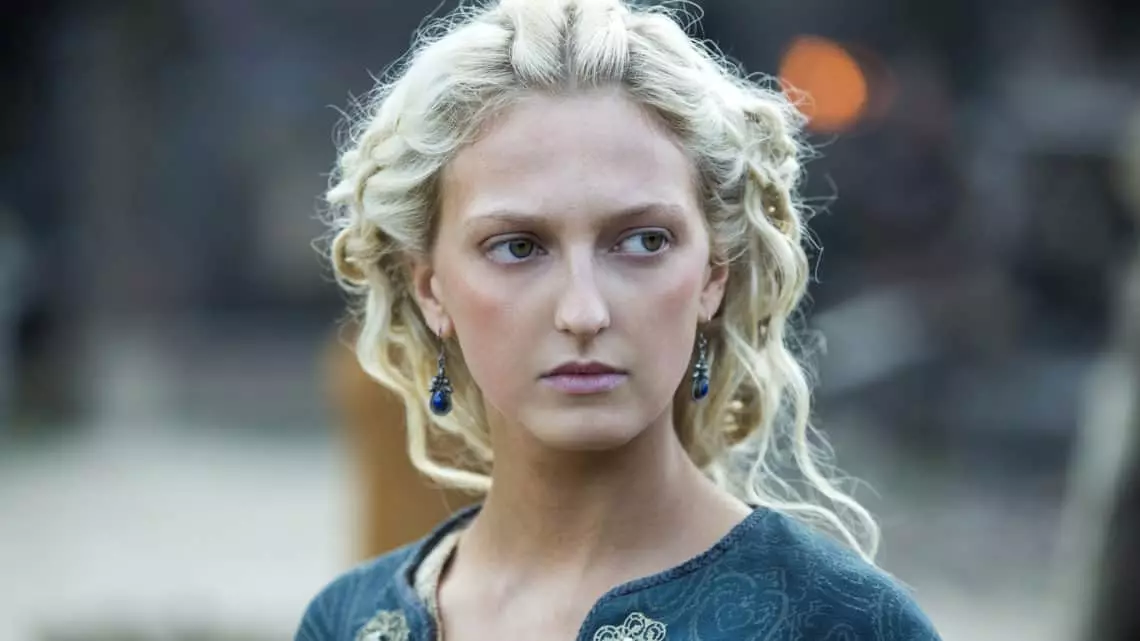Scandinavian names are used by Icelanders, Norwegians, Danes, Swedes and partially Finnish. The category of Scandinavian names is very diverse, represented by biblical, Germanic, as well as ancient Scandinavian names. In this material, let's talk about the origin and the meaning of the Scandinavian names of men and women.

Scandinavian group names: distinctive features
In the names of the Scandinavian group, by analogy with other peoples, the temper of the owner of the name, its advantages and disadvantages is displayed. But unlike Slavic nations, it could not call a person here alone, but several times for life. Why did the name changed during life? One of the reasons is a perfect or bad act, as well as the development of new identity characteristics in the process of growing up.Find out what awaits you today - a horoscope for today for all zodiac signs
By numerous subscribers requests, we have prepared an accurate horoscope application for a mobile phone. Forecasts will come for your zodiac sign every morning - it is impossible to miss!
Download free: Horoscope for every day 2020 (Available on Android)
A strong influence on the appearance of Scandinavian names was played by historical events, in particular, numerous wars. It is striking that the names of both sexes are interpreted almost the same way.
So the features of the lava of the conquerors moved from generation to generation in the names of strong sex. And the manifestations of strength, leaning, courage and courage - they found their embodiment in female names. Consider on specific samples:
- Vigdis - the deity of hostilities;
- Gudhilda is a good battle;
- Svanhilda - battle between swans;
- Brinchild - Woman Warfish.
It is also noteworthy to use two-component Scandinavian female names. Their meaning was displayed abstract objects and concepts, talked about the distinguishing features of the appearance or characteristics of behavior. For example:
- Fredrika - peace-loving government;
- Ragnchild - the battle of defenders.
How did the ancient scandinals choose names for children?
In the ancient Scandinavia, there were their special rituals of the name of the name, which absolutely everything should have adhered to. One of them is the choice of the name of the newborn baby, regardless of the gender, was always only behind the father of the family. Thus, the father gave him the right to life, because only the head of the family could recognize or reject her new member.
When thought, how to call a child, it was necessary to honor the memory of the ancestors who went into the other world. The ancient Scandinavians believed that if you call the son or daughter in honor of the deceased Fatherland - his spirit would return in this body to the physical world.
Girls were always called only the names of the late grandmothers and great-grandmothers - to strengthen the strength of the genus, coming from the ancestors with the same names.
What are the Kantern names differ from modern?
Permanent wars and battles suitable for scandinavians simply could not but affect the names of this people. As mentioned above, female names almost did not differ from men.
The newborn girl could impart in honor of the military event, the battle, the patron saint of hostilities, battles, peace and victories. Of course, the names of the glorious goddesses and heroines were borrowed. In addition, the names of the legendary heroes of the Old History of Epos were quite popular.
Since then, much has changed, and modern residents of the Scandinavian Peninsula are guided by other preferences when choosing female names. So, in priority, those of the names that personify femininity, softness, tenderness, and still beauty, grace - the best qualities of the representatives of the fine sex.
Examples:
- Ingrid - beautiful;
- Inga is the only one;
- Leticia - Happy;
- Sonya is smart;
- Henrick - a controlling house;
- Eydin - Slender addition.

How did the Scandinavian myths affect the formation of names?
The Angles, Normans, are given and saks in their myths bowed to the natural forces, and therefore many of the names of that time were the names of living beings, especially valuable for Vikings. The names of the Voronov - the Holy Bird of Vikings, who personify good luck in military affairs used very popularity.As for the female names of the Scandinavian myths, these are such variations:
- Ulf - Major;
- Freir - Goddess of fertility;
- Khuginn - Thoughts, Spirit;
- Muginne - Memory;
- Stein - Rock;
- Tubogo is the one that protects the torus.
Names originating from nickname
Initially, the bulk of the female and male vandan robust names were combined with various nicknames, so so that they were often difficult to distinguish each other.
Part of the names consisted simultaneously from the nickname, and the name of their own. A vivid example is the name of ALV, which contains the nickname "Elf". According to the nicknames, it was possible to learn a lot about the individual features of the individual:
- Raquel - Sheep;
- Torobe - a woman belonging to the God of Torah.
And, of course, it was not without the nicknames of witches and sorcerers, which are brightly visible in the Scandinavian names:
- Colbinna - Dark, Black Finca;
- Colngrima is a black mask.
Over time, the boundaries between the names and nicknames occur. Therefore, today it is often impossible to establish, with which we are dealing with.
The contribution of Vikings into the formation of Scandinavian names
The famous Wiking Wilrior Warriors carried their culture through the century, gradually turning into modern residents of the Scandinavian Peninsula. The echoes of their heritage can be observed in the Scandinavian immigrants used in our days.
Viking had a very serious attitude to the selection of a name for newborn babies. And this is not surprising, because the militant tribes believed that the name shakes the universe and strongly affects the fate of a man wearing him.

When Chado was made, thereby transferred it to the protection of deities and natural forces. In some names of that time, rituals performed by priests and sorcerers are reflected. Another part - comes military or hunting achievements.
Examples:
- Walborg - Salvation for Flowing in Battle;
- Bodil - battle, revenge;
- Borgilda is a militant, useful woman.
Effect of Christianity on Scandinavian Names
With the introduction of a Christian religion, many new names begins to arise. True, the original Scandinavian nations took them very ambiguously. So, those names of Christians, which was given to children with the ritual of baptism, were secret. And in everyday life, the second name was used - traditional and clear for Scandinavians.Especially negatively new names were perceived by representatives of the military elite: in their families, Christian names received exclusively illegitimate babies. However, over time, religious motifs are woven into the traditional names of Scandinavians and most in women's. Then there are many new variations of the names, some of which is used for our day:
- Christina (otherwise styled) - is a sequence of Jesus;
- Elizabeth - this Lord;
- Evelina - Little Eve;
- Annesis - God's grace.
Scandinavian names are female: list, which means
Now let's turn to the typical names of the residents of the Scandinavian Peninsula and their meaning.
- Adamina - soil, redhead;
- Adeline - noble genus;
- Agneta - Chastity, Holiness;
- Alina - nobility;
- Anitra - fertile, is beneficial;
- Annie is a prosperous, useful;
- Ace - Divine origin;
- Asta - Divine Beauty;
- Astrid is extremely beautiful;
- Aud - with a rich spiritual world;
- Barbro - Alien;
- Birgit - elevation;
- Bodil - battle, revenge;
- Borgilde - a valuable combat woman;
- Brita - sublime;
- Brungilda - Woman Warfish in Combat Equipment;
- Vendle - Warent;
- Vigdis is a war deity;
- Victoria - Winner;
- Wilhelm - it protects her helmet;
- Vivi (otherwise Vivien) - Live;
- Gerd (other than Gerd) - strong physique;
- Gudrun - Magic runes;
- GUNHILDA - Military battle;
- Gunvor - attentive warriper;
- Daggers - new days;
- Dorothea (otherwise Dorta, Dorta) - Gift of the Lord;
- Ida - a hog;
- Ilva - Wolf;
- Inga is the only one;
- INGEBORGA (otherwise Inghegerd) - It protects the ING;
- Ingrid - beautiful;
- Yorun - loves horses;
- Catherine (otherwise Katharina) - pure;
- Carolina - courageous;
- Kaya - Mistress;
- Clara - pure, noticeable;
- Christina - following Christ;
- Leticia - happy;
- Lisbeth - the Lord confirmed it;
- Liv - vital;
- Maya - nursing mommy;
- Margaret - Pearl;
- March - the owner;
- Matilda (otherwise Meclida) is strong in battle;
- Ragan endowed with great wisdom;
- Rune - Secret Knowledge;
- Sanna - Lily;
- Sarah - Royal, a lady of noble origin;
- Sigrid is a great victory;
- Sigruun - Secret Victory;
- Simon - the one that hesitates;
- Sonya - endowed with great wisdom;
- Flowed - Divine Glory;
- Torah - Woman Warrior;
- Tira - Warper Torah;
- Torkilda - the battle of the torus;
- Tuva - Thunder;
- TRIN - clean;
- Tours - Charm Torah;
- Ulla (otherwise ulric) - prosperous and dominous;
- Frida - peace-loving;
- Hatwig - battle between rivals;
- Helen (otherwise Elin) - torch;
- Henrick - a controlling house;
- Hilda (otherwise Hilda) - battle;
- Holdda - closed, keeper of secrets;
- Eydin - Slender addition;
- Elizabeth - received confirmation from God;
- Eric - managing everyone;
- Esther - Star;
- Evelina (otherwise Evelin) - Little Eve.

Scandinavian names Men's: List, which means
Having understood with female names, we turn to the names of representatives of strong sex and their meaning.
- Absalon (otherwise Axel) - is the father of the world;
- Adalshtein - precious mineral;
- Agne - the edge of the sword;
- ALP - Elf;
- Alvis is smart, the one knows everything;
- Anders - a man, warriol;
- ANLAF - heir to the great-grandparents;
- Arkell (otherwise Arne) - Eagle;
- ARN - domineering eagle;
- Arvid - Eagle, squeezing on a tree branch;
- Balder - Lord, Korolevich, has the Son Odin;
- Benedict - received a blessing;
- Birger - saving, guarding;
- Bjarne - Bear;
- Waldemar - peacefully ruling;
- Walter - the main in the army;
- Werner - protected warriol;
- Vidar - Forest Warrior;
- Vigge - Lightning;
- Victor - conquering;
- Wilfred - peace-loving gear;
- Wilhelm - wears a helmet for protection;
- Vilmar is striving for fame;
- Gunnar (otherwise Gunna) - Soldier, Warrior;
- Gustav - the one that meditates;
- Doug - day;
- Dagfinn - Day Traveler;
- Daveny - Twire;
- Siegfried is a peaceful winner;
- Sigmund (otherwise Zigward) - protecting the world;
- Ivar - Worder bow;
- Ingvar - Inga Warrior;
- Ingwe is a friend of Inga, his fan;
- Ingemar (otherwise ingram) - famous ingu;
- Ingolph - Inga Wolf;
- Yoakim (or kim) - Raising God;
- Johan (otherwise Jon) - the Lord is merciful;
- Joseph - Giving God;
- Kai - Lord;
- Kenneth (otherwise Kent) - born of fire;
- Christian (otherwise Christopher) - next for Christ;
- Knut - node;
- Konstantin - solid;
- Cyll - boiler;
- Lars (otherwise lass) - laurel;
- Lauriths (otherwise Lawrence) - living in Lavrentia;
- Leif - heir;
- Lelle (otherwise Lennart or Lenna) - His power is the same as in Lion;
- Ludwig is a nice warriol;
- Magnus - Majestic;
- Mikkel is a godlike;
- Nel (nyal) - winner;
- Nenna - strong, like a lion;
- Niklas (otherly Nicaus) - conquering peoples;
- Njord - possessing great power;
- One - aspirated, frantic;
- Olaf - is the heir of ancestors;
- Oscar - Spear of the Lord;
- Oswald - endowed by the Divine force, the ruler from God;
- Oves - a small blade;
- Lane - stone, rock;
- Pontus - Sea, Sailor;
- Ragnar (otherwise Ragna or Ragnwald) is a wise warrior;
- Ralph - a woven wolf;
- Randolph - protected wolf;
- Rasmus - Beloved;
- Ricard is a mighty ruler;
- ROALD is a famous ruler;
- Roar is a famous spear;
- Ruben - Son;
- Rune - Secret Knowledge;
- Severin - strict;
- Snorre - attack;
- Stefan - Diadem;
- Stig - traveling;
- Surrection - wild, unrestrained;
- Theodore - granted by the Lord;
- Thor (Tore) - Thunder;
- Trading - torus blows;
- Torkel - Torah boiler;
- Torvald - the ruling torus;
- Ulf - Wolf;
- Ulric - prosperous and domineering;
- Finn - a leaving from Finland;
- Folke - Nature, tribe;
- France - French;
- Fryrhof - the one that steals the world;
- Frode - endowed with wisdom;
- Hakan is a high height son;
- Haldor - Torah's rock;
- Halle - rock, stone;
- Chalward - protecting cliffs;
- Harald - the army of the ruler;
- Helge - the Holy, the one who was dedicated to God;
- Hemming - waswolf;
- Henning (otherwise Henrik) - a house manager;
- Herlif - one who grew up in battles;
- Hyalmar (other Hyalmarr) - military helmet;
- Harger is an island with copies;
- Edward - guard of well-being;
- Egill - a small blade;
- Eulert - a strong blade;
- Einar is a lonely warrior;
- Emanuel - wearing God inside himself;
- Emil is a competitor;
- ECH - special;
- Eric - the ruling all;
- Erland (otherwise Erland) - a stranger;
- Esben - Divine Bear;
- This is a kid;
- Jacob - the conqueror;
- Yarl - county, nobleman.
Finally, browse the interesting themed video:
Marissa.
